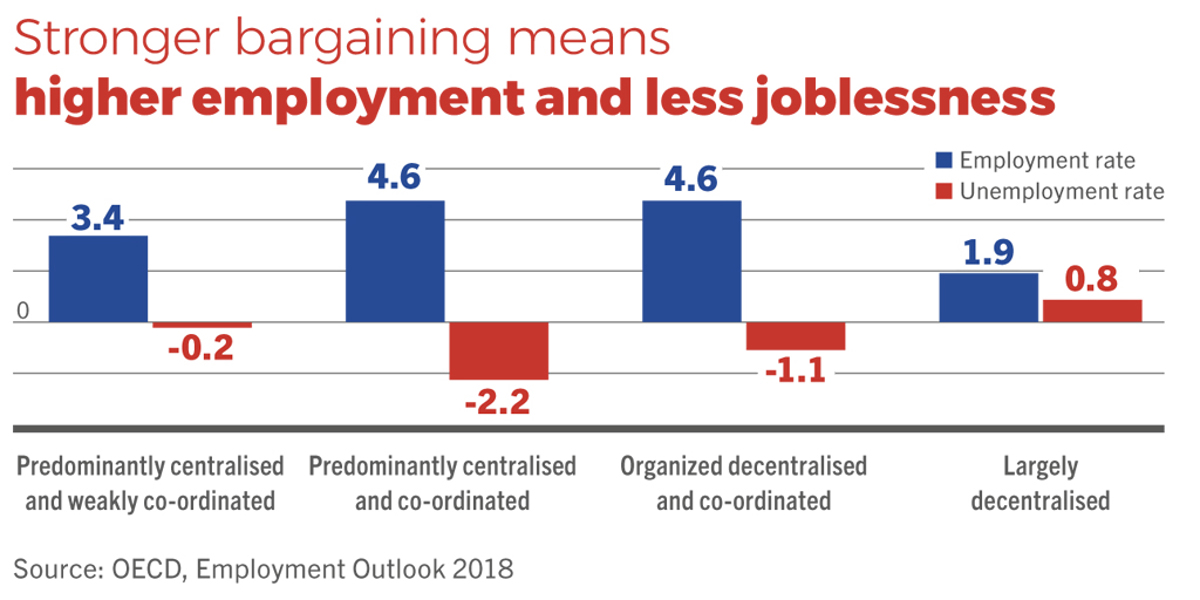We welcome the OECD's change of narrative, but are disappointed that the OECD fails to address the role of its previous recommendations in weakening collective bargaining systems in many countries.
For almost two decades, the OECD had a negative view on collective bargaining at national and sectoral levels and recommended strict decentralisation of bargaining to the company level. With the new report, the organisation has finally changed its narrative and concludes what trade unions have always argued. The OECD now declares that “collective bargaining, provided that it has a wide coverage and is well-coordinated, fosters good labour market performance.” The OECD even goes as far as to argue that “the best outcomes in terms of employment, productivity and wages seem to be reached when sectoral agreements set broad framework conditions but leave detailed provisions to firm-level negotiations.”
This is exactly the message of industriAll Europe’s 'Together at Work' Campaign: Collective bargaining benefits workers, employers and society.
In highlighting the benefits of collective bargaining for society as a whole, the OECD’s arguments are in line with ‘Together at Work’: “a high degree of wage co-ordination across bargaining units [meaning national and sectoral level bargaining] are associated with higher employment and lower unemployment for all workers, compared to fully decentralised systems where bargaining happens only at firm level.”
The OECD continues “wage inequality is higher in countries with firm-level bargaining only or no collective bargaining, compared with countries where workers are covered by sectoral bargaining.”
The OECD finally recognises the extended role of social partners, stating that “the quality of the working environment is higher on average in countries with well-organised social partners and a large coverage of collective agreements.” Moreover, the OECD also recognises the role of social partners in tackling the transformations of industry, arguing that “collective bargaining can indeed ensure that all workers and companies, including small and medium-sized enterprises, reap the benefits of technological digitalisation, organisational changes and globalisation.”
We are glad that the OECD now finally shares the concern of trade unions that “the practical and legal barriers to collective bargaining pose a serious problem since […] collective bargaining systems can help smooth the transition to an increasingly complex labour market.” We agree with the OECD that “making the most of collective bargaining in the future world of work will require some governmental intervention, notably to lift the legal barriers to collective bargaining.”
The recommendations of the OECD’s report are in line with the political demands of our ‘Together at Work’ Campaign, as we both argue that “to make the most of this tool, state regulations need to leave space for collective bargaining, and local representative structures and promote (or at least not discourage) self-organisation of workers and employers. The latter is a precondition for an inclusive and flexible labour market.” Furthermore, we both consider that “regulations might need to be adapted to extend collective bargaining rights to those workers, who share vulnerabilities with salaried employees, and to some self-employed workers in unbalanced power relationships.” Finally, we both think that “collective bargaining should be mobilised to help workers and companies face the transition and ensure an inclusive and prosperous future of work.”
IndustriAll Europe’s General Secretary, Luc Triangle, said: “After decades of unfounded criticism of sectoral collective bargaining, the OECD finally recognizes what trade unions have been advocating for a long time, namely the benefits of collective bargaining for the labour market and society at large. We welcome this change of narrative, but we are disappointed that the OECD fails to address the role of its previous recommendations in weakening collective bargaining systems in many countries. This report is yet another proof that the demands of our ‘Together at Work’ campaign are crucial for the improvement of the European labour market: We need proper national legal frameworks to support collective bargaining.”
For more information and further comment please contact senior policy adviser Isabelle Barthès.
